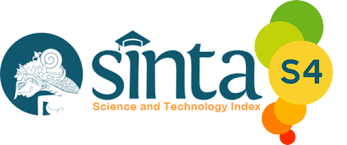PENGARUH KECERDASAN EMOSIONAL DAN COPING TO CHANGE TERHADAP AMBIDEXTERITY: STUDI PADA PERAWAT DI RUMAH SAKIT PUSAT OTAK NASIONAL
DOI:
https://doi.org/10.26630/jkep.v12i1.336Keywords:
ambidexterity, coping to change, kecerdasan emosional, eksploitasi, eksplorasi, perawatAbstract
Tujuan penelitian ini adalah menganalisis pengaruh kecerdasan emosional dan coping to change terhadap ambidexterity pada perawat Rumah Sakit Pusat Otak Nasional. Penelitian ini menggunakan metode kuantitatif dengan melakukan analisis antar dimensi dari variabel yang diteliti. Variabel kecerdasan emosional memiliki empat dimensi, yaitu self emotion appraisal, others emotion appraisal, use of emotion dan regulation of emotion. Variabel coping to change tidak memiliki dimensi. Variabel ambidexterity memiliki dua dimensi yaitu eksploitasi dan eksplorasi. Penelitian dilakukan terhadap 122 perawat di pelayanan rawat inap Rumah Sakit Pusat Otak Nasional, data yang diperoleh kemudian dianalisis dengan menggunakan SPSS 21 yaitu analisis deskriptif dan general linear model. Hasil penelitian menunjukkan bahwa 1) self emotion appraisal memiliki pengaruh terhadap eksploitasi, sementara others emotion appraisal, use of emotion, regulation of emotion dan coping to change tidak memiliki pengaruh terhadap eksploitasi, 2) self emotion appraisal dan coping to change memiliki pengaruh terhadap eksplorasi, dimensi lainnya yaitu others emotion appraisal, use of emotion dan regulation of emotion tidak memiliki pengaruh terhadap eksplorasi.
Â
References
Bonesso, S. Gerli, F., & Scapolan, A. (2013). The Individual Side Of Ambidexterity: Do Individuals’ Perceptions Match Actual Behaviors In Reconciling The Exploration And Exploitation Trade-Off?. European
Efkarpidis, A., Efkarpidis, P., & Zyga, S. (2012). A study of the emotional intelligence of employees at a district hospital of Greece. International Journal of Caring Sciences, Vol. 5 issue 1.
Errikson, P.E. (2013). Exploration and exploitation in project-based organizations: Development and diffusion of knowledge at different organizational levels in construction companies. International Journal of Project Management, pp 333-341.
Gibson, C.B., Birkinshaw, J. (2001). Contextual Determinants of Organizational Ambidexterity. Center of Effective Organizations.
Gibson, C.B., Birkinshaw, J. (2004). The Antecedents, Consequences, And Mediating Role Of Organizational Ambidexterity. Academy of Management Journal, Vol. 47, No. 2, 209–226.
He, Z., Wong, P. (2004). Exploration vs Exploitation: An Empirical Test of The Ambidexterity Hypothesis. Organization Science, Vol.15, No.4, pp481-494.
Instalasi Rekam Medik Rumah Sakit Pusat Otak Nasional. (2015). Laporan Rekam Medik Rumah Sakit Pusat Otak Nasional Januari-September 2015. Rumah Sakit Pusat Otak Nasional.
Judge, T.A., Thoresen, C.J., Pucik, V., & Welbourne, T.M. (1999). Managerial Coping With Organizational Change: A Dispositional Perspective. Journal of Applied Psychology, Vol. 84, No. 1, 107-122.
Kreitner, R. & Kinicki, A. (2007). Organizational behavior. New York: Mc Graw Hill.
Law, K.S., Wong, C., Song, L.J. (2004). The Construct and Criterion Validity of Emotional Intelligence and Its Potential Utility for Management Studies. Journal of Applied Pshychology, Vol.89, No.3, 483-496.
Law, K.S., Wong, C. Huang, G., Li, X. (2007). The effects of emotional intelligence on job performance and life satisfaction for the research and development scientists in China. Asia Pacific J Manage.
March, J,G. (1991). Exploration and Exploitation in Organizational Learning. OrganizationScience, Vol. 2, No. 1, page 71-87.
Mom, T.J., van den Bosch, F.A.J., Volberda, H.W. (2009). Understanding Variation in Managers’ Ambidexterity: Investigating Direct and Interaction Effects of Formal Structural and Personal Coordination Mechanisms. OrganizationScience, Vol. 20, No. 4, pp. 812–828.
Naseer, Z., Chishti, S.H., Rahman, F., & Jumani, N.B. (2011). Impact of Emotional Intelligence on Team Performance in Higher Education Institutes. International Online Journal of Educational Sciences, pp 30-46.
Pangesti, A.D. (2015, Oktober 28). Hasil wawancara di Rumah Sakit Pusat Otak Nasional.
Pical, R.F., Haryani, L., Pusmaranga, R. (2015, Desember 10) Hasil Focus Group Discussion di Rumah Sakit Pusat Otak Nasional.
Universitas Indonesia. (2008). Pedoman teknis penulisan tugas akhir
World Health Organization. (2013). WHO nursing and midwifery progress report 2008-2012. Agustus 3, 2015. http://www.who.int/en/







.png)



